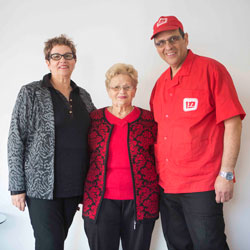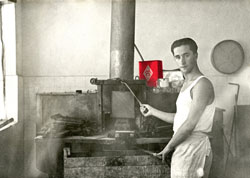Israeli Scene
Life + Style
Wafer-Thin Survival

I confess. I have a sweet tooth. I am one of those people who sit down in a restaurant, hand the wine menu back to the waiter and ask to see the dessert menu instead.
Perhaps it is because sweets have been my extended family’s source of income for four generations. Or—despite sugar’s bad rap today—because sweets saved the lives of my maternal grandparents. Or because they also saved my father’s life, thus enabling me to be born. But that sweet tooth could also come from my having lived nearly all my adult life in Israel, where the per capita consumption of sugar and sweeteners is well above the world average (though only about half that of the United States), according to the Food and Agriculture Organization of the United Nations. Every man, woman and babe in arms here, on average, downed more than 75 pounds in 2011, the last year for which figures are available.
Perhaps the most popular sweet in Israel is the cream-filled wafer cookie, known commonly as a vafel or vafla (plural vaflim) and called sugar wafers in the United States. For some, it is known by the baffling bastardization bafla (plural baflot), which has given rise to a brand name. If it is chocolate-coated (metzupeh shokolad), soldiers—who shorten all terms—refer to it simply as metzupeh. And if it is true that an army marches on its stomach, there is no question but that the Israel Defense Forces marched on its metzupeh for decades.
Israelis have a marked preference for chocolate-cream-filled vaflim (83 percent of sales in Israel, 70 percent abroad). Their second choice is lemon, whereas abroad it is vanilla.
Sold in every Israeli supermarket, grocery shop and convenience store, vaflim are consumed by 92 percent of households, according to a consumer survey. There is something about the vafel’s melt-in-your-mouth taste of paradise that, for a moment, eases the tensions of this sulfurous region. To maintain that good feeling, of course, you have to reach for another—and another. Israelis reach so often for vaflim, in fact, that per capita they are the world’s second-greatest consumers of this treat, after the Austrians, from whom the manufacturing knowhow came here.
Now all of this might seem like esoteric information, but it is close to my heart: Israel’s second-largest brand of vaflim—the Man label manufactured by Rokachman, Ltd.—was founded by my Uncle Max (Menahem) Rokach and is run today by his children and grandchildren. Their factory in Ramle employs 30 local residents—many of them immigrants from the former Soviet Union who arrived in the 1990s—and is fully automated: The cream is spread, the wafer layers are stacked and the stacks are cut and packaged almost all without the touch of human hands.

But it wasn’t always that way. The ancestral roots of Rokachman lie in Vienna, where my grandfather Lazar (Elazar) Rokach had a sweets factory in which everything was done by hand. Even the baking of the crisp layers was done manually with a complicated machine that looked like a Rube Goldberg contraption.
Each machine had several sets of double plates, like the plates of waffle irons but with much finer cross-hatching, that were rotated horizontally around a heated core. With a metal hook, a worker would lift the hot upper plate on one set, pour in the thin batter, put down the upper plate and move that set sideways, thus gaining access to the next set of double plates. By the time a set of plates had made one full turn around the heated core, the wafer was baked. The worker removed it deftly—there was always the danger of breakage—and poured in another round of batter.
Another worker spread the cream and stacked the creamed wafers, and yet another worker wielded a large sharp knife to cut the stack into rectangles. Finally, batches of wafers were wrapped and boxed by hand.
My grandparents, who had lived in Vienna since World War I, stayed put in the 1930s despite the growing Nazi threat. But in 1938, my grandfather was able to obtain two of the coveted immigration certificates to Palestine, for himself and my grandmother, because he was a “capitalist,” that is, he could bring machinery with him and thus contribute to the economy.
And so it was that my grandparents were able to escape just before Hitler invaded Austria in March 1938. Once in Palestine, my grandfather joined Lieber, one of the country’s major sweets manufacturers at the time, and began production of Lieber vaflim, using his own machines. (In 1970, long after my family and Lieber had parted ways, Lieber was bought out by its main competitor, Elite, which merged with Strauss in 2004.)
Uncle Max, who had worked in my grandfather’s factory in Vienna and had studied confectionery in a vocational school, worked alongside my grandfather at Lieber. In 1954, when the Lieber connection came to an end, the machines passed to Max.
Rokachman Ltd. was born in a factory just east of Tel Aviv in Bnei Brak, whose population is largely ultra-Orthodox. First, Max formed a cooperative with three partners, but after three years it was in deep trouble. He managed to get loans to buy out his partners and reestablish the company on his own. His wife, Pnina, joined him in this venture, and my grandmother, too, helped out in the factory packaging the vaflim.
Even in the company’s earliest stages, Man vaflim had a crucial advantage besides the flavor: the kashrut certification of Rabbi Moshe Yehuda Leib Landau of Bnei Brak, which was widely accepted among ultra-Orthodox Jews. (Perhaps it helped that our family had tons of yichus, claiming descent from the revered 17th-century Elazar Rokach, the chief rabbi of Brody and then of Amsterdam, and the ancestor of the Belzer Rebbe.) Since the move to larger premises in Ramle, the company has added the kashrut certification of Rabbi Yehiel Abu-Hazera, that city’s chief rabbi.
Today, the Man label is the biggest seller (in terms of revenue) of vaflim, and the second-biggest seller of cookies, to the Israeli ultra-Orthodox market. And about 20 percent of the company’s sales are to Jewish communities in other countries, including the United States, Canada, France and Russia as well as to Chabad houses around the world. The company has doubled its overall sales in the past decade and continues to grow, with the help of modern marketing and distribution techniques.
Distribution in the early days was vastly different. In a banged-up van—the Israeli-made fiberglass Sussita—with large metal boxes of vaflim stacked on the roof, Aunt Pnina would drive the length and breadth of the country, bringing the delicate sweets to shops and kiosks. She would also bring them to IDF canteens, where the Man metzupeh was a staple item for decades. Even I got a share; Max and Pnina never came to visit me in Jerusalem without a large package of their goodies.
Over time, the company branched out, producing different baked treats in addition to its vaflim flavors (aside from chocolate, lemon and vanilla, there are coffee and halva). In 1991, it added whole-wheat cookies to its line. Its cookies now include vanilla, chocolate and lemon, as well as granola. In the early years, the company also produced popular kosher-for-Passover cookies.
“But we had to stop making those,” recalls Zipora (Zippi) Peker, Max’s daughter and my cousin, who is now the co-CEO alongside her younger brother, Elazar. The process of preparing the machines for holiday production involved incinerating every remnant of hametz with blowtorches, but “the blowtorches ruined the machines,” she said.
Running a small factory is a grueling business. Max used to rise at 4 A.M. to turn on the ovens. And the whole family was involved. Zipora said she worked there from the age of 12, whenever her parents went on vacation and full time as soon as she completed IDF service. To study, she took courses at night.
For her parents, “what was important was work,” she says. “They didn’t talk much.” Clearly, that tradition has continued in her generation.
In a tightly run family business, there is no room for airs. Both Zipora and Elazar step in and work on the line when there is a problem. And each of the CEOs has a son involved with the factory: Zipora’s son Avi, who is in charge of marketing and sales, and Elazar’s son Sagi, who is in charge of the production lines.
In January 2015, to mark the Man label’s 60th anniversary, the company repositioned itself, emphasizing that all of its 30-plus products—except for the granola cookies, which contain honey—are vegan and are now prominently labeled so. That, of course, means that they are also pareve.
And though the IDF canteens no longer sell the well-known Man metzupeh, the company still produces it, retaining the original red, white and blue packaging and logo that so many Israelis remember from their military service.
Like many family histories, ours is bittersweet. On the sweet side was the romance: Uncle Max met Aunt Pnina through her sister, who worked with him in the Lieber factory, and one of his two sons met and married a young woman who worked in the Rokachman factory.
But there was another side. My mother wanted to be a doctor, but because my grandfather needed help in the factory in Vienna, she never realized that dream. In Israel, after my grandfather died, there were family rifts and feuds, all of which seem to have become muted with the passage of time.
And then there is the story of how my father’s life was saved thanks to sweets. Like many Holocaust survivors, he never told me this story, and I was able to piece it together only after his death when, on my way home from a press visit to Hungary, I stopped in Vienna for a few hours to visit a woman named Emmy Wacha. I knew nothing about her except that my father had corresponded with her regularly until he died. It was during that visit that I learned just how strong their connection was.
My parents, unable to obtain immigrant certificates to Palestine, had remained in Vienna with their infant son after the Nazi invasion. On November 9, 1938—Kristallnacht—my father was arrested and was about to be deported to a concentration camp. In exchange for my father’s gold watch, the guard looked the other way and my father escaped. But it was too dangerous to return home.
It was then he turned to Wacha, a non-Jewish employee in my grandfather’s sweets factory. Risking her life, she hid him in her home until he could arrange to flee to Belgium, which was still free. Eventually, he, my mother and my older brother were reunited in Belgium and, at the last moment, escaped to the United States, where I was born.
And that alone is enough to explain my penchant for sweets.








 Facebook
Facebook Instagram
Instagram Twitter
Twitter
Leave a Reply